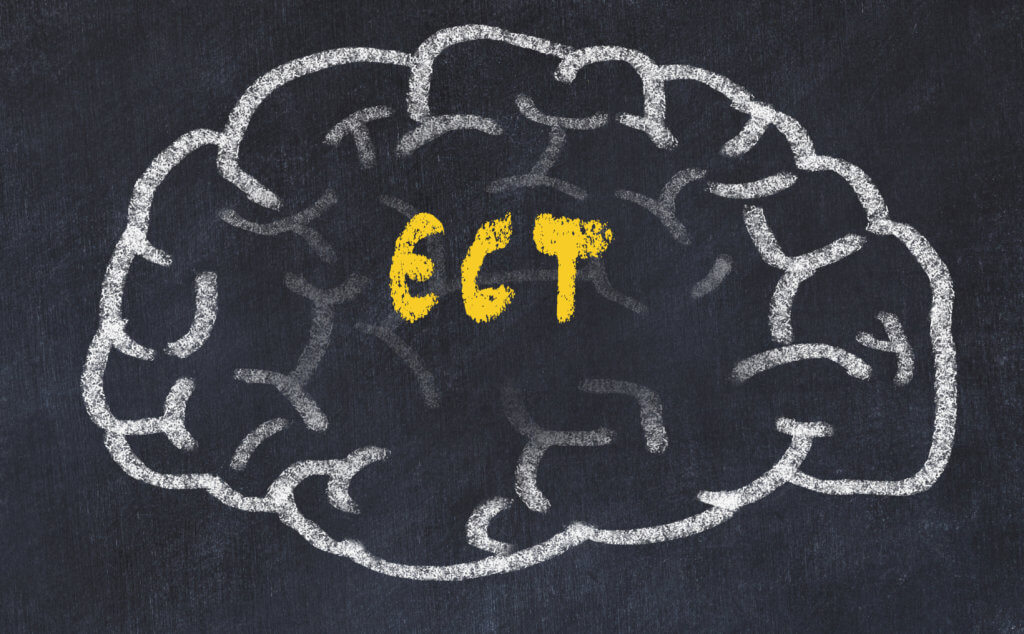The clinical use of electroconvulsive therapy (ECT) — for any disorder — is often seen as both antiquated and barbaric by the general public. However, a new observational study on older adults with mood disorders showed a marked reduction in the risk of long-term all-cause mortality and short-term suicide in patients who received ECT, according to research from Yale University.
Pop cultural depictions of electroconvulsive therapy, like those seen in One Flew Over the Cuckoo’s Nest or Requiem for a Dream, have led to the widespread misunderstanding of what it is, how it is used in clinical settings, and what it can treat.
But the use of ECT has proven to be both safe and effective in the treatment of some treatment-resistant disorders, such as depression and bipolar disorder. In fact, for some patients where other treatment options have previously failed, the treatment can be a godsend.
What is ECT?
Electroconvulsive therapy involves administering a brief electrical stimulation to the brain of patients while they are under anesthesia. In this study, researchers observed 41,260 participants aged 65 or older, with an average age of 75. Each of the participants had been admitted as an inpatient for a psychiatric diagnosis of some type, and roughly one-quarter of participants were given ECT at a therapeutic level.
Participants who received ECT had a decreased risk of death from all causes one year after discharge. Additionally, a substantial reduction in suicide rates was observed in the first three months after discharge for those participants who received ECT, indicating both short and long-term benefits for patients.
While a decrease in suicide rates was observed three months after discharge for those who received ECT, there was no change in suicide rate one year after discharge—indicating the benefits may wear out over time. Given these findings, the use of ECT should be more widely considered as an option for inpatients with mood disorders, particularly those who are seen as a short-term suicide risk, according to the study.
Looking to the future
Researchers also observed a clear distinction in the outcomes for those who received therapeutic ECT levels versus sub-therapeutic levels, which involves the administration of the therapy at a level lower than traditionally prescribed.
“I think one of the most striking things from our study was the strong association of ECT and a reduction in mortality among older adults. This had been shown by prior research, but one of the interesting things was how the individuals receiving sub-therapeutic ECT had an almost identical risk of mortality as those who did not receive ECT for the first three months following hospitalization,” said senior author, Samuel Wilkinson, in a statement.
The general public may still misinterpret the use of electroconvulsive therapy. But the substantial benefits found in the controlled, clinical use of ECT for certain disorders appears undeniable, according to researchers.
This study was originally published in The American Journal of Psychiatry.
Article written by Adam Swierk













Fascinating…so playing with a BBQ fork in an electrical outlet is healthier for Grandma than it is for Junior.
Who knew?
Really not funny. This was a wonderful article and its comments like yours that keep the stigma on mental illness. I’ve had this, so I know what it does. Find another sandbox to play in.
It is a Godsend! My wife received the treatment. Then I volunteered and wanted to have after witnessing the effects.
ANY physical thing cannot impact that which began in the mind of God, but is merely symbolic of Him.
‘Science’ is committing suicide simply by being increasingly obnoxious and outrageous in their absurdity, because- exemplified by 1st Eve- as many as ONE single error(!) lead to death by ignorance: the inability to recognize BS on their own, and its vicious defense instead. (Hence the existence of bible allegory…)
They live longer, but can’t remember why.
You are absolutely correct! I have had ECT treatment and I have lost decades of memory. The use on seniors is to make them manageable, pliable and agreeable. Dementia often makes people irritable and agitated – difficult for health workers and family to manage them. ECT solves the problem for the caregivers.
The treatment is not painful when administered. It IS a barbaric transformation of the patient. There are other treatments for depression.
Do NOT allow anyone you truly love get this quick and dirty treatment.
hahahaha good one
My dear friend had ECT, which caused her to lose a great many of her memories. She didn’t remember vacations we had taken together or many of the other experiences she had in the several years prior to the ECT. Not too long after her ECT ‘therapy’ ended, she was successful in committing suicide.
I too received ECT. It is barbaric. It has ruined my life. It destroyed my memory , which in turn destroyed my health. Used to be witty and life of the party, now I talk with a slur as it , I believe gave me a stroke.
It is not about lifespan as much as it is about Healthspan.
Significant memory loss is a known side-effect. This side-effect has to be weighed against the perceived benefits. Another consideration, it was not stated that the treatment group was randomly chosen, so this study could be subject to selection bias.
Psychedelics also help with depression and other psychiatric disorders, but apparently, until very recently, there has been more support within the government and the medical profession, in terms of funding studies and so on, to apply electricity to one’s brain than to administer a chemical or plant. That mindset is rather revealing, in my opinion.
Risk of death fell by what PERCENT? 5%? 85%? It matters.
One year does not a lifetime make
For death by suicide, 1-year survival analysis showed no group difference.
A significant association was observed with suicide in the first months following ECT,
ECT can increase suicidal tendencies. People feel used and discarded, and humiliated. This is not therapeutic. ECT was and is dangerous. I had a brother in law who was a psychiatrist who made a small fortune from overuse of ECT, and was reprimanded by the State of California for his actions. He was a closet sadist, who beat his wife if she didn’t clean the house to his standards.
What bothers me is how the use of electricity to the brain, first observed in the beginning years of the twentieth century in Italy as a method of controlling hogs prior to slaughter, somehow made it to 21st century science. The chain of reasoning is amazing.
ECT is a moneymaker for doctors, and hospitals, simply put.
My comment not approved.
To the point a little too much, perhaps?
I stick a fork into my toaster for long-term effects; and tap a 9V battery on my tongue for a quick pick-me-up.
If it’s recommended by psychiatrists and psychologists, stay away. Those two professions have done more harm than any other profession going. They can have ‘recommendations’ forced. They are very dangerous.
I don’t believe a single statement from these vag-jerks
How does this compare to a good old-fashioned, tried and true lobotomy?
There has been a rash of celebrity suicides since last summer.
I wonder how many of them and others- particularly the copycat suicides- might have benefited from ECT.
ECT destroys people. This article is a total lie. Check out http://www.CCHR.org
Really interesting post!
nutelees